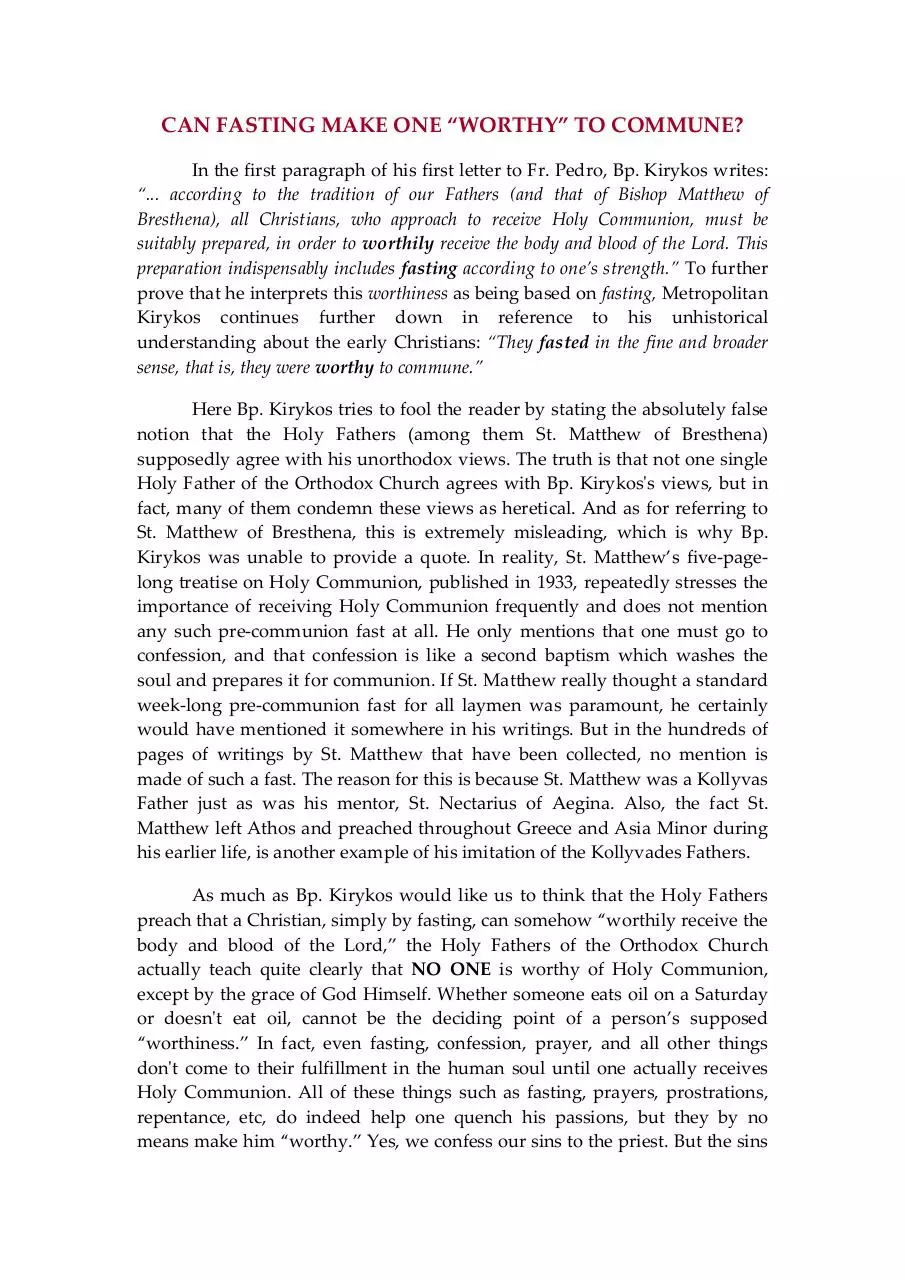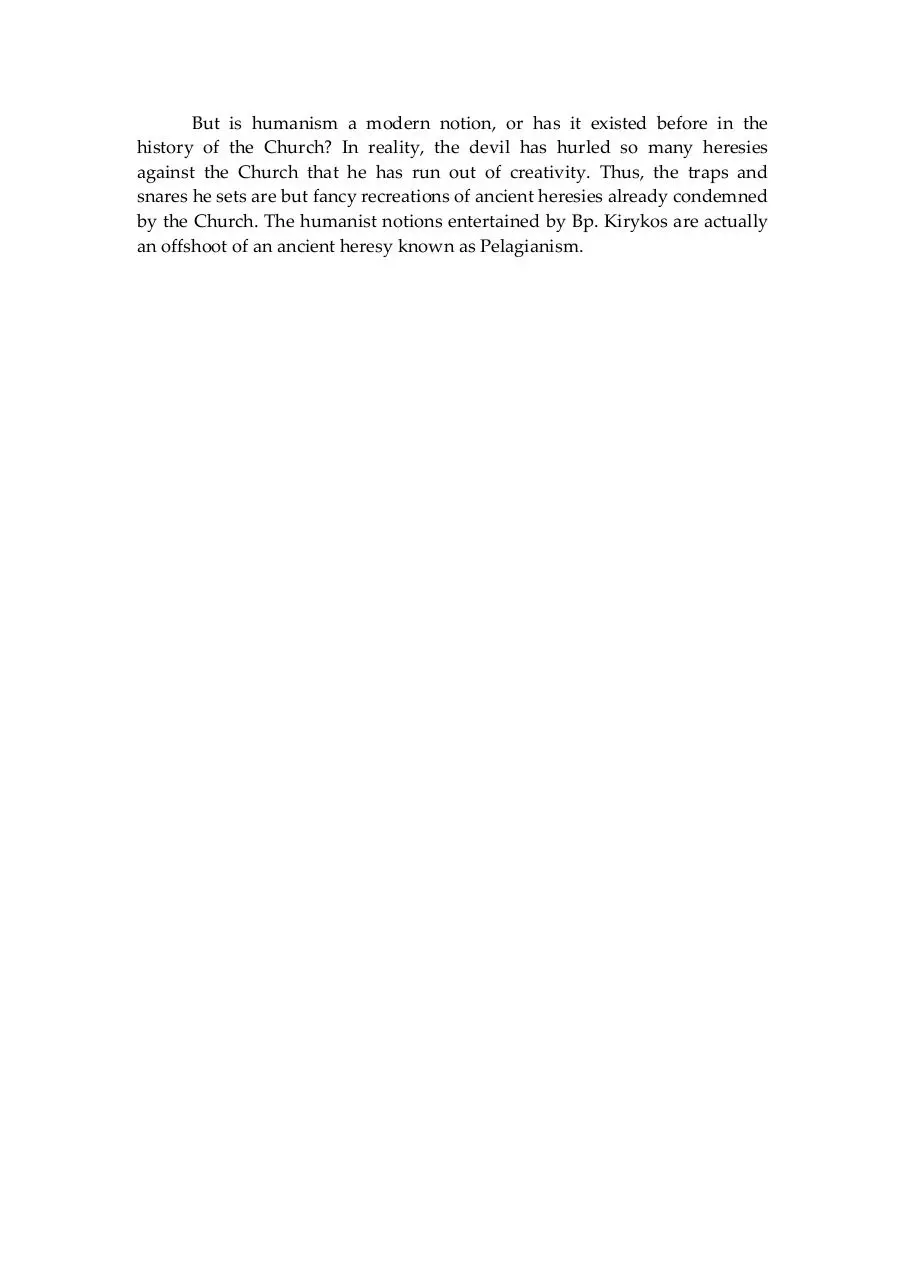contracerycii01 (PDF)
File information
Title: THE FIRST HERESY OF BP
Author: Stavros
This PDF 1.4 document has been generated by Acrobat PDFMaker 8.1 for Word / Acrobat Distiller 8.1.0 (Windows), and has been sent on pdf-archive.com on 23/09/2014 at 09:20, from IP address 46.176.x.x.
The current document download page has been viewed 561 times.
File size: 153.94 KB (3 pages).
Privacy: public file



File preview
CAN FASTING MAKE ONE “WORTHY” TO COMMUNE?
In the first paragraph of his first letter to Fr. Pedro, Bp. Kirykos writes:
“... according to the tradition of our Fathers (and that of Bishop Matthew of
Bresthena), all Christians, who approach to receive Holy Communion, must be
suitably prepared, in order to worthily receive the body and blood of the Lord. This
preparation indispensably includes fasting according to one’s strength.” To further
prove that he interprets this worthiness as being based on fasting, Metropolitan
Kirykos continues further down in reference to his unhistorical
understanding about the early Christians: “They fasted in the fine and broader
sense, that is, they were worthy to commune.”
Here Bp. Kirykos tries to fool the reader by stating the absolutely false
notion that the Holy Fathers (among them St. Matthew of Bresthena)
supposedly agree with his unorthodox views. The truth is that not one single
Holy Father of the Orthodox Church agrees with Bp. Kirykosʹs views, but in
fact, many of them condemn these views as heretical. And as for referring to
St. Matthew of Bresthena, this is extremely misleading, which is why Bp.
Kirykos was unable to provide a quote. In reality, St. Matthew’s five‐page‐
long treatise on Holy Communion, published in 1933, repeatedly stresses the
importance of receiving Holy Communion frequently and does not mention
any such pre‐communion fast at all. He only mentions that one must go to
confession, and that confession is like a second baptism which washes the
soul and prepares it for communion. If St. Matthew really thought a standard
week‐long pre‐communion fast for all laymen was paramount, he certainly
would have mentioned it somewhere in his writings. But in the hundreds of
pages of writings by St. Matthew that have been collected, no mention is
made of such a fast. The reason for this is because St. Matthew was a Kollyvas
Father just as was his mentor, St. Nectarius of Aegina. Also, the fact St.
Matthew left Athos and preached throughout Greece and Asia Minor during
his earlier life, is another example of his imitation of the Kollyvades Fathers.
As much as Bp. Kirykos would like us to think that the Holy Fathers
preach that a Christian, simply by fasting, can somehow “worthily receive the
body and blood of the Lord,” the Holy Fathers of the Orthodox Church
actually teach quite clearly that NO ONE is worthy of Holy Communion,
except by the grace of God Himself. Whether someone eats oil on a Saturday
or doesnʹt eat oil, cannot be the deciding point of a person’s supposed
“worthiness.” In fact, even fasting, confession, prayer, and all other things
donʹt come to their fulfillment in the human soul until one actually receives
Holy Communion. All of these things such as fasting, prayers, prostrations,
repentance, etc, do indeed help one quench his passions, but they by no
means make him “worthy.” Yes, we confess our sins to the priest. But the sins
aren’t loosened from our soul until the priest reads the prayer of pardon, and
the sins are still not utterly crushed until He who conquered death enters
inside the human soul through the Mystery of Holy Communion. That is why
Christ said that His Body and Blood are shed “for the remission of sins.”
(Matthew 26:28).
Fasting is there to quench our passions and prevent us from sinning,
confession is there so that we can recall our sins and repent of them, but it is
the Mysteries of the Church that operate on the soul and grant to it the
“worthiness” that the human soul can by no means attain by itself. Thus, the
Mystery of Pardon loosens the sins, and the Mystery of Holy Communion
remits the sins. For of the many Mysteries of the Church, the seven highest
mysteries have this very purpose, namely, to remit the sins of mankind by the
Divine Economy. Thus, Baptism washes away the sins from the soul, while
Chrism heals anything ailing and fills all voids. Thus, Absolution washes
away the sins, while Communion heals the soul and body and fills it with the
grace of God. Thus, Unction cures the maladies of soul and body, causing the
body and soul to no longer be divided but united towards a life in Christ;
while Marriage (or Monasticism) confirms the plurality of persons or sense of
community that God desired when he said of old “Be fruitful and multiply”
(or in the case of Monasticism, “Behold, how good and how pleasant it is for
brethren to dwell together in unity!”). Finally, the Mystery of Priesthood is
the authority given by Christ for all of these Mysteries to be administered.
Certainly, it is an Apostolic Tradition for mankind to be prepared by fasting
before receiving any of the above Mysteries, be it Baptism, Chrism,
Absolution, Communion, Unction, Marriage or Priesthood. But this act of
fasting itself does not make anyone “worthy!”
If someone thinks they are “worthy” before approaching Holy
Communion, then the Holy Communion would be of no positive affect to
them. In actuality, they will consume fire and punishment. For if anyone
thinks that their own works make themselves “worthy” before the eyes of
God, then surely Christ would have died in vain. Christ’s suffering, passion,
death and Resurrection would have been completely unnecessary. As Christ
said, “They that be whole need not a physician, but they that are sick
(Matthew 9:12).” If a person truly thinks that by not partaking of oil/wine on
Saturday, in order to commune on Sunday, that this has made them
“worthy,” then by merely thinking such a thing they have already proved
themselves unworthy of Holy Communion. In fact, they are deniers of Christ,
deniers of the Cross of Christ, and deniers of their own salvation in Christ.
They rather believe in themselves as their own saviors. They are thus no
longer Christians but humanists.
But is humanism a modern notion, or has it existed before in the
history of the Church? In reality, the devil has hurled so many heresies
against the Church that he has run out of creativity. Thus, the traps and
snares he sets are but fancy recreations of ancient heresies already condemned
by the Church. The humanist notions entertained by Bp. Kirykos are actually
an offshoot of an ancient heresy known as Pelagianism.
Download contracerycii01
contracerycii01.pdf (PDF, 153.94 KB)
Download PDF
Share this file on social networks
Link to this page
Permanent link
Use the permanent link to the download page to share your document on Facebook, Twitter, LinkedIn, or directly with a contact by e-Mail, Messenger, Whatsapp, Line..
Short link
Use the short link to share your document on Twitter or by text message (SMS)
HTML Code
Copy the following HTML code to share your document on a Website or Blog
QR Code to this page

This file has been shared publicly by a user of PDF Archive.
Document ID: 0000185266.